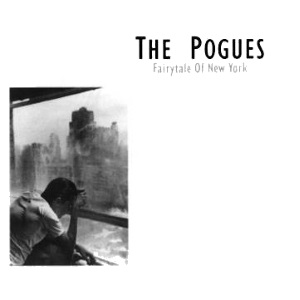
"Fairytale of New York" is a song written by Jem Finer and Shane MacGowan and recorded by their London-based band the Pogues, featuring English singer-songwriter Kirsty MacColl on vocals. The song is an Irish folk-style ballad and was written as a duet, with the Pogues' singer MacGowan taking the role of the male character and MacColl playing the female character. It was originally released as a single on 23 November 1987 and later featured on the Pogues' 1988 album If I Should Fall from Grace with God.

Galore is a compilation album released by Kirsty MacColl in 1995. It features material previously released on the studio albums Desperate Character (1981), Kite (1989), Electric Landlady (1991) and Titanic Days (1993), among other tracks by MacColl, totalling eighteen songs. Some of the tracks differ from their original releases; a couple of songs, such as "Innocence", are alternate takes, while "Miss Otis Regrets" is a different edit that omits the second half, "Just One of Those Things", performed by the Pogues. On release the album peaked at No. 6, MacColl's highest ever charting album.

Electric Landlady is Kirsty MacColl's third studio album. Released in 1991, it was her second Virgin Records release and second collaboration with producer/husband Steve Lillywhite. The title is a pun on Jimi Hendrix's album Electric Ladyland.

Titanic Days is the fourth studio album by Kirsty MacColl, released in 1993. Containing eleven tracks, Titanic Days was sometimes hard to get in years after its release, but it was remastered and re-released in 2005 by ZTT with a second CD of non-album tracks and some live recordings, including a version of "Miss Otis Regrets". In 2012, another remastered re-issue of the album was released by Salvo/ZTT, which again featured a second disc of bonus tracks. This is the final album to be produced by her husband Steve Lillywhite, before they divorced several years after the release.

"My Affair" is a song by British singer and songwriter Kirsty MacColl, released by Virgin on 29 July 1991 as the second single from her third studio album, Electric Landlady. It was written by MacColl and Mark E. Nevin, and produced by Steve Lillywhite. "My Affair" reached No. 56 in the UK and remained in the charts for two weeks. A music video was filmed to promote the single.
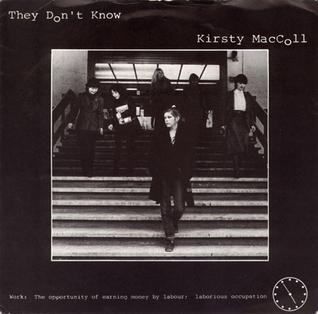
"They Don't Know" is a song composed and first recorded in 1979 by Kirsty MacColl. Though unsuccessful, the song was later recorded by Tracey Ullman in 1983. Ullman's version reached No. 2 in the UK and No. 8 in the US.
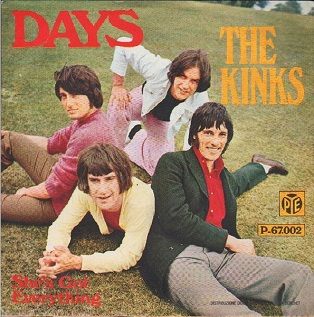
"Days" is a song by the English rock band the Kinks, written by Ray Davies. It was released as a non-album single in June 1968. It also appeared on an early version of the album The Kinks Are the Village Green Preservation Society. It now appears as a bonus track of the remastered CD. On the original Pye 7N 17573 label, the name of the song is "Day's" owing to a grammatical error.
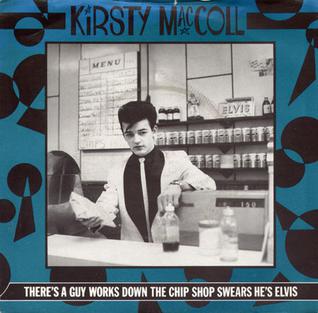
"There's a Guy Works Down the Chip Shop Swears He's Elvis" is a song by British singer-songwriter Kirsty MacColl, which was released as the lead single from her debut studio album Desperate Character. The song was written by MacColl and Philip Rambow, and produced by Barry Farmer. It reached No. 14 in the UK Singles Chart and remained in the charts for nine weeks. In the US, the song's British chip shop reference was changed to truck stop.
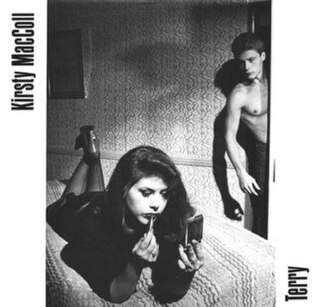
"Terry" is a song by Kirsty MacColl, released as a single in October 1983, and charting at No. 82 in the UK the following month. It was her first release after returning to Stiff Records, and was the last in a run of poorly selling singles released between "There's a Guy Works Down the Chip Shop Swears He's Elvis" and "A New England". The music video featured an appearance from actor and comedian Ade Edmondson, who played MacColl's rejected boyfriend who got her back after fighting off a rival man. The photo on the front sleeve features MacColl and Chris Heester.
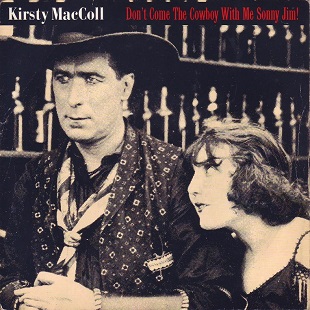
"Don't Come the Cowboy with Me Sonny Jim!" is a song by British singer and songwriter Kirsty MacColl, which was released in 1990 as the fourth and final single from her second studio album Kite. It was written by MacColl and produced by Steve Lillywhite. The song reached No. 82 in the UK and remained in the charts for four weeks. A music video was filmed to promote the single, directed by Sarah Tuft.

Desperate Character is the first solo album of British singer-songwriter Kirsty MacColl, released in 1981. The album was re-released in March 1985 as Kirsty MacColl, with three tracks replaced with other songs. The album has been remastered and received a CD release for the first time on 8 October 2012 on the Union Square Music label and features the original twelve track listing.

Kirsty Anna MacColl was a British singer-songwriter, daughter of folk singer Ewan MacColl. She recorded several pop hits in the 1980s and 1990s, including "There's a Guy Works Down the Chip Shop Swears He's Elvis" and cover versions of Billy Bragg's "A New England" and the Kinks' "Days". Her first single, "They Don't Know", had chart success a few years later when covered by Tracey Ullman. MacColl also sang on a number of recordings produced by her husband Steve Lillywhite, most notably "Fairytale of New York" by the Pogues. Her death in 2000 led to the "Justice for Kirsty" campaign.

"Walking Down Madison" is a song by Kirsty MacColl featuring Aniff Cousins, released by Virgin Records on 7 May 1991 as the lead single from her third studio album, Electric Landlady. It charted at No. 23 on the UK Singles Chart and impacted a number of Billboard charts.

"Free World" is a song by British singer and songwriter Kirsty MacColl, released on 20 March 1989 as the lead single from her second studio album, Kite. It was written by MacColl and produced by Steve Lillywhite. "Free World" reached number 43 in the UK Singles Chart and remained in the top 100 for seven weeks.

"Innocence" is a song by British singer and songwriter Kirsty MacColl, which was released in 1989 as the third single from her second studio album Kite. It was written by MacColl and Pete Glenister, and produced by Steve Lillywhite. "Innocence" reached No. 80 in the UK and remained in the charts for four weeks. The song's music video was filmed in the back garden of MacColl's home in Ealing. It was directed by Sarah Tuft and features a cameo appearance from Edward Tudor-Pole.
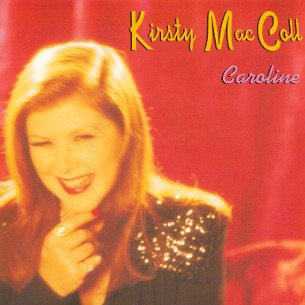
"Caroline" is a song by British singer and songwriter Kirsty MacColl, released in February 1995 as a single from her compilation album Galore. The song was written by MacColl, and produced by Victor Van Vugt and MacColl. "Caroline" reached number 58 in the UK Singles Chart and remained in the top 100 for two weeks.

"In These Shoes?" is a song by British singer and songwriter Kirsty MacColl, which was released in 2000 as the second single from her fifth studio album Tropical Brainstorm. It was written by MacColl and Pete Glenister, and produced by MacColl, Glenister and Dave Ruffy.
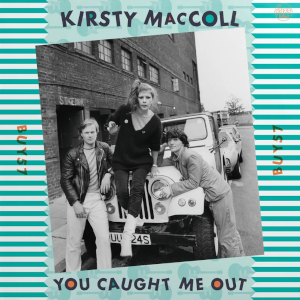
"You Caught Me Out" is a song written by Kirsty MacColl, Pete Briquette and Simon Crowe. It was originally recorded by MacColl in 1979, with Liam Sternberg as the producer, but the intended single release later that year was shelved. In 2023, it was issued as a limited edition 7-inch single. Versions have also been recorded by Australian singer Christie Allen and British-American singer/actress Tracey Ullman.
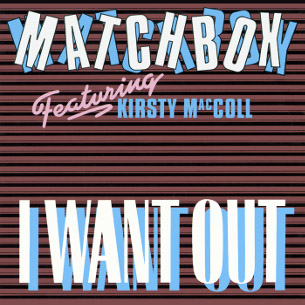
"I Want Out" is a song by English rockabilly band Matchbox featuring Kirsty MacColl. It was released in 1983 as the third and final single from the band's sixth studio album Crossed Line (1982). It was written by Brian Hodgson, Ray Peters and Tony Colton, and produced by Hodgson.

"See That Girl" is a song by English singer-songwriter Kirsty MacColl, released on 18 September 1981 by Polydor as the second single from her debut studio album, Desperate Character. It was written by MacColl and produced by Barry "Bazza" Farmer.




















